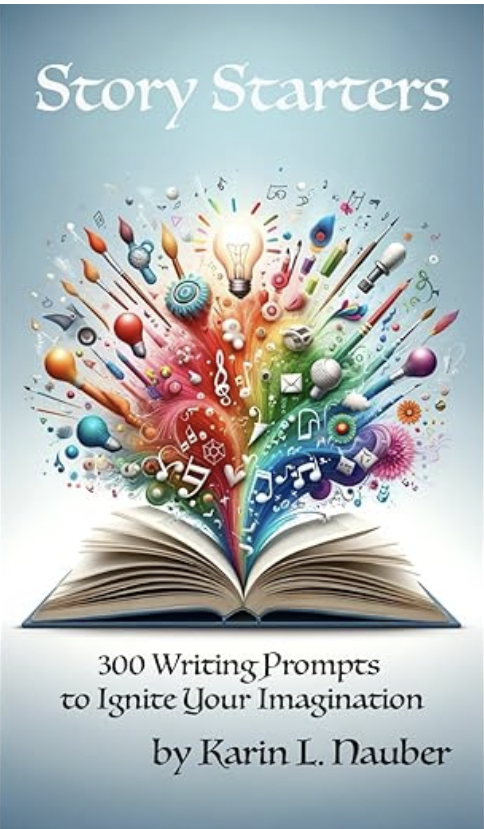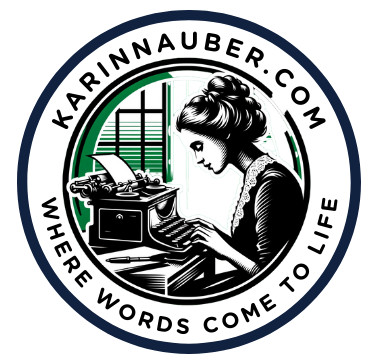I’m going to let you in on a little secret: the power of creative routines. This isn’t just about setting an alarm and staring at a blank page at the crack of dawn. Although there is certainly something to be said for getting up early, having that first cup of liquid inspiration (COFFEE!) and putting your fingers to the keyboard or your pen to the page!
Establishing a creative routine goes deeper than that, although that can work. A creative routine hinges on creating a personalized rhythm that fits you and your writing style. Think of it as an anchor that keeps your muse from drifting away on the days when inspiration seems like a distant memory.
 Writing prompts aren’t always enough to keep you going and staying on task. Writing prompts certainly do help, however. I recently finished my own writing prompts book after writing about it in a previous post. It is available on Amazon in e-book format and paperback. I recommend the paperback simply because I left many blank pages in the book where you can start writing after reading a prompt! The book is called Story Starters and you can get it here.
Writing prompts aren’t always enough to keep you going and staying on task. Writing prompts certainly do help, however. I recently finished my own writing prompts book after writing about it in a previous post. It is available on Amazon in e-book format and paperback. I recommend the paperback simply because I left many blank pages in the book where you can start writing after reading a prompt! The book is called Story Starters and you can get it here.
Setting up a personalized writing routine can be a game-changer. You’re going to find out that this isn’t a one-size-fits-all deal; it’s about finding what clicks for you. It could be the quiet of the early morning hours, the hubbub of a lively cafe in the afternoon, or the solitude of late nights. It’s about carving out that non-negotiable time and space to engage with your craft.
When you are balancing family, work and friends, finding, or making, that time to write can be difficult, but it is a must if you want to succeed!
If you want a dose of inspiration, consider how successful writers structure their day. From Haruki Murakami’s early morning runs to Maya Angelou’s hotel room bookings, their routines are as unique as their prose. Each routine reflects their personal philosophy and approach to the creative process. Don’t worry too much about replicating theirs to a tee—choose something that works for you.

For me, I like to sit at my kitchen table with a cup of black coffee and music playing in the background. Then I just start writing. Or I pick one of the writing prompts from my book and just start imagining.
You can always adjust what you do down the road, but what’s essential is recognizing the value of rituals in different phases of writing. A brainstorming session may require a bustling environment while editing might demand absolute tranquility. Pay attention to how your routine serves your current writing phase and adapt as necessary. Now, in the spirit of seeking fresh inspiration let’s transition to a different strategy: Exploring new horizons beyond the writing desk.
Exploring New Horizons: Seeking Inspiration Beyond Writing
I’m going to let you in on a little secret: inspiration doesn’t always come from sitting at your desk and staring at a screen. As a writer, you’re more than your words. Think of yourself as a vessel that needs to be filled with varied experiences, sights, and sounds to overflow onto the page.

This should be kind of a “no-brainer” but we often only see writing as the physical act of producing words on a blank page.
Exploring new thing is going to include breaking away from the written word at times to absorb different art forms. Whether it’s painting, music, performance art, or any other mode of expression, each encounter helps you weave rich textures into your narratives. You’re going to find out about the world through a new lens each time you step into a different realm of creativity.
Don’t worry too much about sticking strictly to your genre or niche either. Cross-pollination of ideas can ignite unprecedented innovation in your work. Travel, be it a short local trip or a visit to a far-off land, exposes you to new scenery and customs that can spark storylines and character traits you may never have considered.
Cross-pollination! Speaking of which, what about a Zombie love story in outer space? Oh, I don’t know, maybe it’s between two zombies or a zombie and a human or a zombie and an alien. Are there alien zombies? You can go far and long with any idea if you put your mind to it.
And let’s not underestimate the power of simply engaging with life. Conversations at a coffee shop, people-watching at the park, or volunteering for a cause can all spark your imagination. Think of these experiences like research for your next big idea. Or maybe, just go out and enjoy life and don’t think of it as a research study! Just throw the ball with your kids or go shopping in a fancy store that you maybe don’t ever shop in. You might even find that you really like these things!
You are going to be learning things and you won’t even know it because you are having so much enjoyment.
Cross-disciplinary learning broadens your horizon more than you might expect. Take a language class, or dabble in psychology or history. The knowledge you gain from these subjects could inspire writing that resonates with truth and authentic detail.
As you absorb these wide-ranging experiences, remember that your mind is behind the scenes, processing and connecting dots. When you pivot back to the written word, you’ll be armed with a treasure trove of fresh inspiration.
Maintaining a Writer’s Mindset: Cultivating Resilience
I’m going to talk about an often-overlooked aspect of staying inspired: resilience. You’re going to find out about why resilience is crucial for every writer and how to strengthen it. This isn’t just about pushing through writer’s block; it’s also about growing from your experiences.
Think of building resilience as creating an internal armor that helps you face the challenges of writing head-on. When you hit a rough patch, remember that maintaining a positive but realistic writer’s mindset is key to bouncing back. Don’t worry too much about the occasional creative drought; instead, see it as a natural part of the creative cycle.

If you want to cultivate resilience, choose activities and thoughts that nurture and build your confidence and ability to persist. This can involve setting aside time to reflect on your progress, celebrating small wins, and learning from feedback. Adjust your approach down the road to keep challenging yourself and developing your skills.
I would suggest journaling about these things that way you have a record of where you were and can look back upon it when you feel like you are not progressing!
Community support is often underestimated in its power to fortify a writer’s resilience. Sharing your writing journey with peers or mentors can provide encouragement and fresh insights that help you surmount hurdles. Engage in writing groups or online forums to connect with others who understand the highs and lows of the craft.
If there isn’t a writing group near you and you like the in-person meetings, start your own group! Call up a few friends and start meeting. My writer friends and I meet about once a month to talk about writing, about life and share what we have been up to in the writing field. All of us practice such diverse types of writing and publishing it is fun to see where people are at and what has changed from month-to-month!
Fueling the Flame: Continuous Learning and Development
You’re going to find out about the inexhaustible well of knowledge that’s available for writers who are eager to grow. Every book you read, every workshop you attend, and every piece of feedback you mull over is another log on your creative bonfire, stoking your inspiration to blazing new levels.
Choose something that resonates with you when it comes to your education as a writer. If contemporary poetry excites you, dive into verse. If technological advancements fascinate you, explore how they can impact storytelling. There’s no one-size-fits-all approach, and that’s the beauty of it.
Rather than worrying about sudden surges of inspiration, focus on the steady hum of progress. Engaging with new technologies and platforms can be invigorating, offering fresh ways to share your work and connect with readers. It’s about staying relevant and excited in an evolving landscape.
I really hope that you take the time to stay updated with industry trends. Publishing is a world that’s changing quick, and you need to keep up not just to remain relevant, but also to find new opportunities that could give your writing career a serious boost.
Always be open to rewriting, relearning, and reimagining your work. This openness to continuous improvement will keep the inspiration flowing, ensuring that your writing journey is as rewarding as it is enduring.
 Practice some of these habits and you can watch your words come to life!
Practice some of these habits and you can watch your words come to life!
Karin

Hi there
I enjoyed reading your post
Indeed staying inspired as a writer, as detailed in the insightful article by Karin Nauber, involves a multifaceted approach combining routine, varied experiences, and self-care.
Nauber emphasizes the importance of setting a dedicated writing time, exploring new environments, and continually feeding the mind with diverse content to fuel creativity. Additionally, she highlights the need for self-compassion and taking breaks to prevent burnout. This holistic strategy not only nurtures inspiration but also sustains long-term writing passion and productivity.
Thanks again
I am glad you found my site. I hope it helped inspire you. If you have any questions or would like more prompts, please feel free to follow me on Facebook at: https://www.facebook.com/profi…
Best wishes on your writing endeavors!
Karin 🙂
I love using writer prompts, they can really open the way to a new story or a way or looking at what’s ahead in a different way.
Thanks for writing such an inspirational article on writing. It is the efforts of others that turn me towards what I’m meant to do in this world!
Thank you for connecting, Rudy. I am glad that my site has provided the inspiration you needed to get yourself going towards what you are meant to do in this world! That is the whole point of the website. Our words can and do come to life!
Karin 🙂